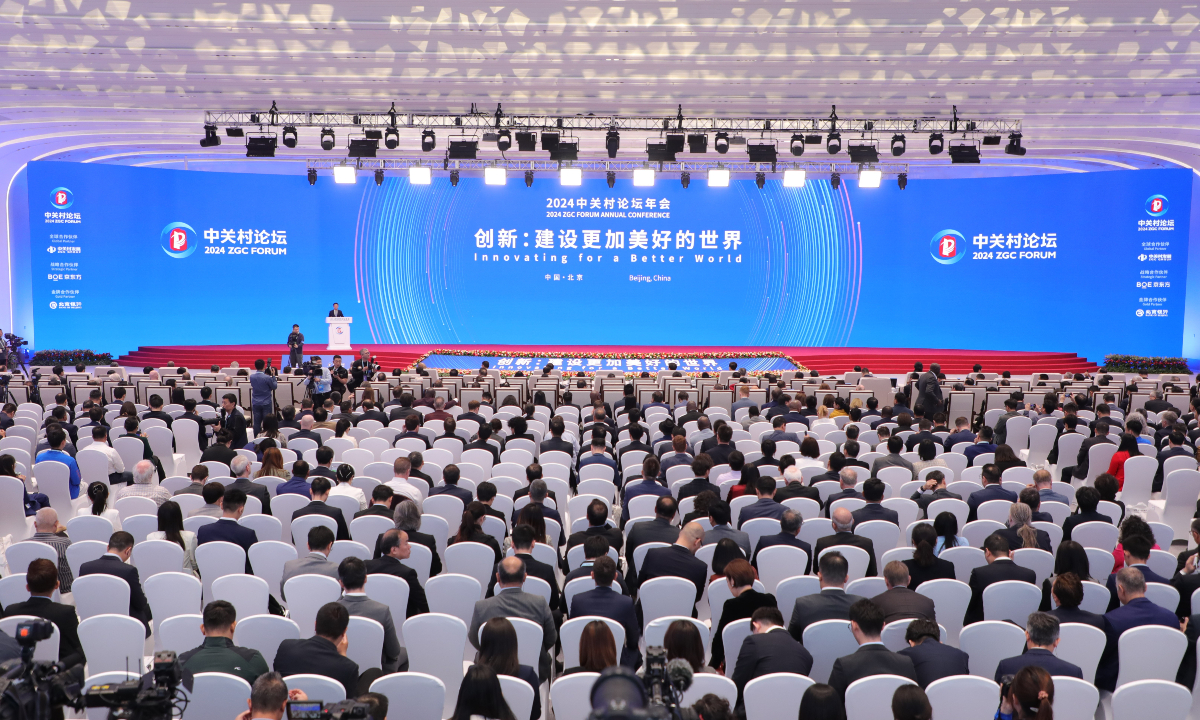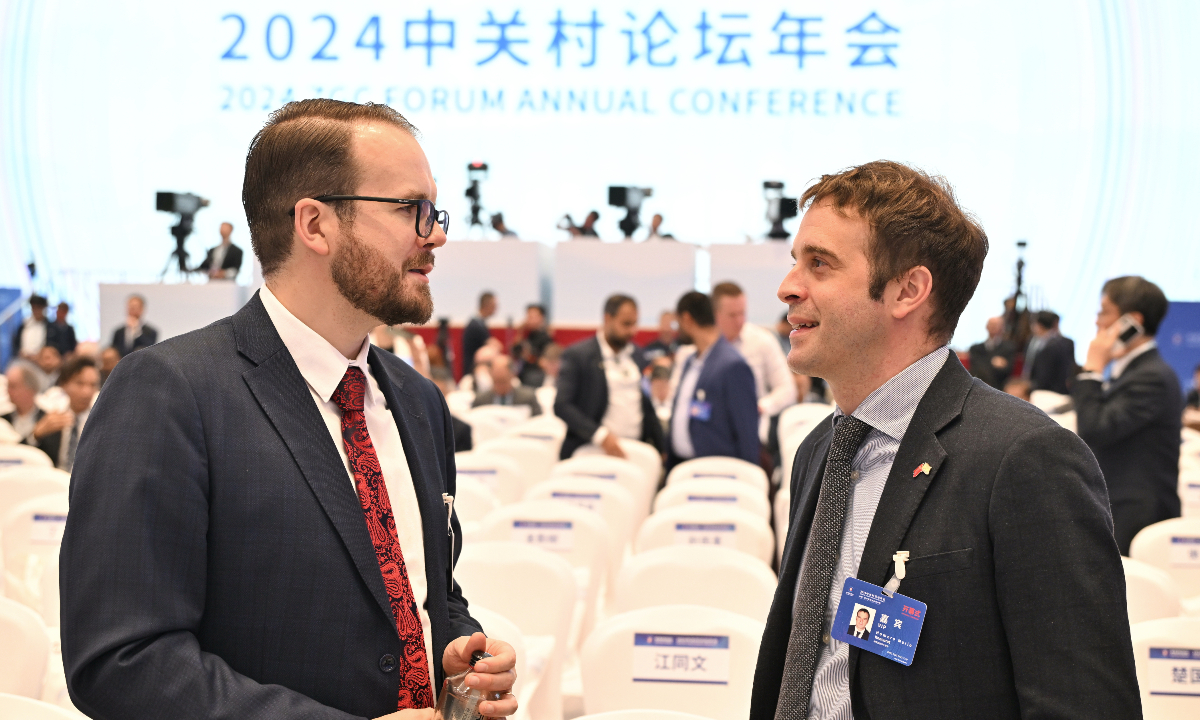(Source:Global Times,2024-04-25) ZGC forum Photo: VCG China on Thursday kicked off in Beijing a major forum focusing on scientific and technological (sci-tech) cooperation, with participants from more than 100 countries and regions. ZGC forum Photo: VCG
This is regarded as another example of the country's commitment to pursuing sci-tech self-reliance, while also promoting global cooperation amid disruptions caused by some Western countries.
The Zhongguancun (ZGC) Forum, a national-level platform for global technological exchanges and cooperation, also showcased China's latest sci-tech achievements as well as projects from dozens of countries and regions. The event demonstrated not only that some Westerns countries' crackdown measures will not stop China's sci-tech development, but also that the global sci-tech community and businesses remain committed to cooperation with China, attendees and experts said.
In a speech at the opening ceremony on Thursday morning, Chinese Vice Premier Ding Xuexiang said that China has implemented the strategy of innovation-driven development, achieved new breakthroughs in scientific and technological innovation, and cultivated new industries, business models and growth drivers, which have become a prominent highlight of economic and social development.
China is willing to work with the international community to put into action the principles of open, fair, just and nondiscriminatory international cooperation in science and technology, and foster a global community of science and technology, Ding said. He urged the international community to jointly create an open innovation ecosystem, cultivate and develop new quality productive forces, and solve major scientific and technological problems.
This year's ZGC Forum focuses on emerging technologies, including artificial intelligence (AI), life sciences and new materials. Representatives from more than 100 countries and regions have registered to attend the five-day event. Moreover, competitions in frontier technologies organized by the forum drew more than 3,100 projects from 75 countries and regions, while the trading section attracted over 6,000 projects from more than 40 countries and regions.
Launched in 2007, the ZGC Forum has risen to global prominence as a major platform for international sci-tech exchanges and cooperation. Based in Beijing's Zhongguancun, a national-level high-tech development zone known as China's Silicon Valley, the forum also provides a window into China's latest sci-tech developments and policies on global cooperation. On Thursday morning, the forum released 10 major sci-tech results in areas such as advanced chips, AI and quantum computing.
China is a powerhouse of innovation that contributes to global growth and sustainable development, Marco Aleman, assistant director-general of the World Intellectual Property Organization (WIPO), said at the opening ceremony in Beijing on Thursday, while commending the ZGC Forum on its remarkable achievement in promoting global exchanges and cooperation in science, technology and innovation.
China's critical role
At the forum, many Chinese and foreign participants also highlighted China's sci-tech achievements as well as its critical role in promoting global sci-tech cooperation.
I think that China has [played] a major role in facilitating [cooperation], for example, by creating the ZGC program, Antonius Bisseling, a foreign member of the Chinese Academy of Engineering (CAE) and professor at Wageningen University in the Netherlands, told the Global Times on the sidelines of the forum on Thursday.
In another major step to further promote global cooperation, the ZGC Forum also for the first time hosted a parallel session in the Xiong'an New Area, North China's Hebei Province on Thursday. Xiong'an is about 110 kilometers from downtown Beijing. The session drew about 600 Chinese and foreign experts and academics who attended to discuss cooperation in areas such as aerospace.
Many foreign attendees also came to see the latest sci-tech development trends in China and explore opportunities to cooperate with China.
[I] come to see China's progress in technology and see [what] kind of cooperation we have, Daouda Bitie, Ambassador of Burkina Faso to China, told the Global Times on Thursday, adding that there are many innovations on display and Beijing has made big progress in becoming an innovation center.
Such enthusiasm among foreign guests attending the ZGC Forum showed not only China's rise as a global sci-tech powerhouse but also its openness and promotion of cooperation, experts said.
The wide international participation shows the increasingly important role China plays in global sci-tech development, as many guests view cooperation with China as mutually beneficial, Song Guoyou, deputy director of the Center for American Studies at Fudan University told the Global Times on Thursday, noting that through cooperation with China, foreign researchers and entities can find not only research partners but also a market for the application of their research.
Song further pointed out that while the US and some other Western countries continue to seek to crack down on China's sci-tech development, China has not only made progress in its own innovation capabilities, but also offered greater opportunities for global entities through continuous opening-up.
From a global perspective, China's high-level opening-up is actually bringing opportunities to more countries, including cooperation related to the science and technology industry, he said, adding that foreign crackdowns have accelerated China's pursuit of self-reliance in the sci-tech fields.
Despite Western crackdowns, China has been making steady progress in cutting-edging technologies such as AI, quantum computing, and 5G technologies. In 2023, China remained the top country of origin for Patent Cooperation Treaty (PCT) applications with 69,610 filings, significantly higher than the US' 55,678 filings, according to WIPO. Meanwhile, Chinese telecommunications giant Huawei remained the top filer of PCT applications, followed by South Korea's Samsung and US-based Qualcomm.
With abundant resources for sci-tech development, Beijing has also become a major leader in the country's innovation-driven development strategy. Zhongguancun, for example, is home to more than 17,000 national high-tech enterprises, and Beijing is stepping up investments to bolster sci-tech innovation. In the first quarter of 2024, the city's investment in high-tech industries jumped by 33.7 percent year-on-year.
Song Guoyou,“China kicks off major forum amid push for sci-tech reliance, global cooperation”
发布时间:
2024-04-25
访问次数:
10
